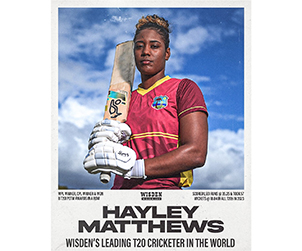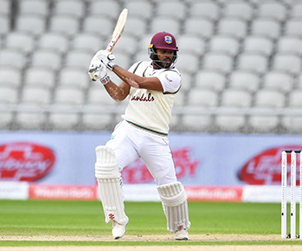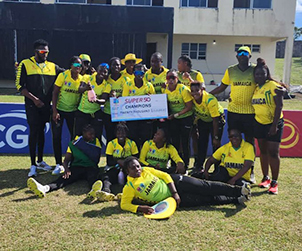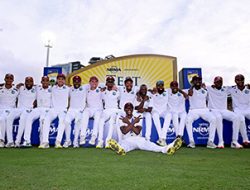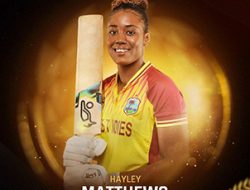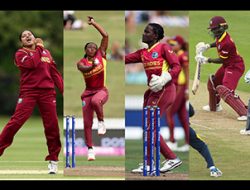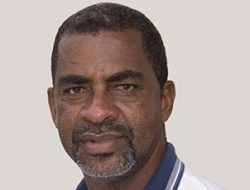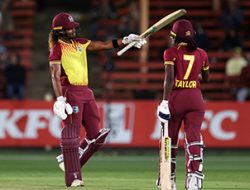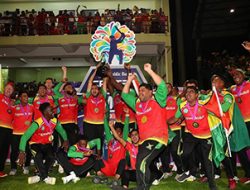Jimmy Adams reflects on West Indies v Australia in the 1990s. Featuring star turns from Lara, Pidge, Ambi, Tugga… and Michael Bevan
Coming into the 1990s, West Indies were the undisputed kingpins of Test cricket. By the turn of the millennium, the baton had been passed to Australia. Over the course of the decade, the two teams had some titanic struggles for the Frank Worrell Trophy. Starting as a whippersnapper twelfth man in a dressing room full of greats and finishing as captain of a team in sharp decline, Jimmy Adams saw the changing of the guard at close quarters.
The 1990-91 series in the Caribbean had been won 2-1, with Australia picking up a dead-rubber victory in Antigua. Allan Border’s back-to-basics leadership was starting to bear fruit. Gordon Greenidge retired at the end of that series, while Viv Richards, Malcolm Marshall and Jeffrey Dujon would call time at the end of the subsequent tour to England.
1992-93: Australia 1, West Indies 2
We started the tour with some good performances in the state games. Batsmen got runs, bowlers got wickets, so we were in a good place. There was an immense amount of self-belief in our senior players: people like Dessie, Richie , Curtly , Courtney. I can’t remember feeling any self-doubt from them when we sat and discussed the opposition and what we were hoping to get out of the series. I’d been around the West Indies dressing room in Jamaica in 1990, when they lost to England, and I remember thinking all hell was going to break loose after the game. But Viv and Greenidge and all of them weren’t like that: they just spoke about the next Test match and getting it right.
By the end of the first Test we were very well aware that it was going to be a tough series. It ended in a draw, but you’d probably say more points to them than to us. The key factor for us was the strength of our bowling attack, and we had enough performances from the bowlers to suggest that we were in a pretty good place.
Australia’s win in Melbourne and the draw in Sydney featured breakthrough performances from two future all-time greats of the game.
Warne got wickets, but at the time he wasn’t the focal point of our discussions. We had a lot of respect for the pairing of Merv Hughes and Billy McDermott. I mean, McDermott was an excellent bowler, swinging the ball at his pace, and with consistency.
We can look back now at Sydney and just say “typical Lara”: lots of drives and cuts and sweeps, things that we’ve seen a lot of times since then. It was the first time the rest of the world was beginning to see not only someone who scored hundreds but who scored big hundreds.
With two Tests to play, West Indies had their backs to the wall, but they had just beaten Australia 2-0 in the World Series Cricket finals. The series was turned around with a dramatic one-run win in Adelaide.
The senior players weren’t panicking and that had a big influence on everything else. Ambrose and Walsh, Richie and Dessie, they were sort of, “We’re okay, there’s two Tests to go, even though we’re one-nil down.”
I guess the team was also on a bit of a high, having won the WSC, and you could argue that that self-belief helped in the last few overs in Adelaide. Ambi and Courtney were just going to bowl until we either win or lose. It gets to the point where there’s no more planning. It’s just two bowlers versus two batsmen and we’ll see where we end up in ten minutes, ‘cos it’ll be over by then.
The series was sealed with an innings victory in Perth.
They were 90-odd for 2 at lunch, and the decision was taken to pitch it up a little more and see what happens. It worked in the end, but it was very much a case of not only having the ability to plan but also to carry it out. Take nothing away from Ambi, it was a great spell. From that point we may still have been the No. 1 team in the world but it was very apparent that there was nothing between the two teams. Nothing. As much as you’re going to enjoy a result like that at Adelaide, if Tim May’s clip hadn’t hit Desmond in the shins at forward short leg, those three runs would have won the Test match. Then Australia would have won the series. But going to Perth, we knew we were going to win that Test. Don’t ask me how. We just knew. And it happened.
The closeness of the two teams created a bit of an edge, and there were one or two flashpoints.
I don’t know if there was any particular animosity in this team towards the Australia team. There could have been. I’ve heard players in my team over the years identify players from the opposition and say, quite plain, “I don’t like that person.” The reverse is true as well, of course. But Merv Hughes and David Boon were in our dressing room almost every day. They came in with two six-packs and they’d just drink them with anybody. Sure, guys would be warring. So you’d have maybe Healy and Brian, or Healy and Dessie, warring. Nobody didn’t pay it any mind. Merv and Boonie – they couldn’t care less.
1994-95: West Indies 1, Australia 2
I think there were a lot of distracting things happening in and around the team at the time. Maybe that’s just me, but we’d changed the management team before the tour. We’d been travelling with Rohan Kanhai as coach and David Halford as manager for three years, and just before the series started they brought in a new manager and a new coach [Andy Roberts]. They did things differently. And I don’t think the squad was as focused as we could have been. At that level, you’re off by one per cent and sometimes that’s enough. To me it just seems silly. You’re coming into a “world championship” and the management team that has built strong relationships for three years – to sort of disband them just before that series I thought was a bit counterproductive.
Also, the whole captaincy thing was going back and forth because Richie had been suffering from chronic fatigue syndrome. He’d missed touring India and New Zealand. Courtney had stepped in, filled the gap, and we’d sort of gotten through. Richie comes back, which… every right he should be back as captain. He’d scored runs in regional cricket. But it’s still a different dynamic.
Australia won in Barbados, despite an exhilarating Lara-Hooper partnership on the opening day.
I might be wrong, but I don’t think Brian and Carl had many big partnerships. Brian’s big partnerships came with the sort of batsmen who were happy to give him strike and let him dominate. You give him what he wants because if he ends up still there tonight, we’re in a hell of a position. Whereas there might be times – just like Greenidge and Richards, back in the day – when he might have been competing with Carl to get at a particular bowler.
It was evident that Mark Taylor was putting his stamp on things.
Allan Border’s team, when playing well, epitomised what he was like as an individual: very tough, very uncompromising – even more so than your standard stereotype of an Australian. Taylor was probably a more attacking captain. That was the personality he brought to it, I think, but maybe he had more at his disposal. Eras create leaders, and I’m not sure if a Mark Taylor-type captain would have worked in the late 1980s, in the same way that a coach like John Buchanan rather than a Bob Simpson wouldn’t have been what was needed for the team to start making strides forward.
Australia were also helped by the emergence of Glenn McGrath.
By the time that series had finished, we knew that were potentially looking at the next very good Australian bowler. He became great, but at the time we wouldn’t have known how good he would go on to be. But we certainly had an idea. He’d definitely taken over from Billy McDermott as Australia’s No. 1, which was an achievement in itself.
A rain-affected draw in Antigua followed, then West Indies levelled with a win on a poor Trinidad pitch.
It had grass on it. The wicket was such that if it didn’t have that kind of grass, it would have crumbled. I think Shane Warne would have been in his element. But it was a very sporty wicket. I remember batting with Lara and we ended up discussing and agreeing on what for us would have been a pretty unorthodox approach to try and score runs. Maybe in normal circumstances some of the deliveries we looked to score off we wouldn’t have done. I remember Paul Reiffel bowled some impossible deliveries, but your bog-standard delivery was probably one that would get you out on a surface like that, because it was seaming about so much. You had to find a way to cash in before that happened.
The series decider, in Jamaica, was settled by a performance for the ages from Steve Waugh.
I don’t think we batted very well in that Test match. And as with most good teams, if you open the door part way, they’ll kick it down. We did that when we beat them in Adelaide. That was like a foot in the door for us, and when we went to Perth and saw that pitch, we kicked the door down. It happens, you know. The key is not to open that door, even halfway.
West Indies, meanwhile, were starting to creak.
There was a lot that came out in that particular game, even before the game started. It was a very emotional time. We knew we were up against it. There was a stark contrast between the West Indies team in 1995 going into the final Test at one-all at Sabina Park, versus the West Indies team in 1993, going into the Test at Perth one-all. There was a stark contrast in the whole outlook, in the vibe in the team, probably the self-belief. That was a fact. In hindsight, I would venture to say that the senior players for Australia would have seen and felt that difference. I was still a grasshopper in international cricket, but when I’d just gotten old enough to understand these things, there’s no doubt in my mind that the hierarchy of the Australian team would have been pumping it into them: this is not the same West Indies team that went to Perth one-all two years ago.
I don’t think we had a team by the end of that series. Issues which had been floating around started to impact mindsets on and off the field, which, for two closely matched teams, could be a dealbreaker. And this is not to take anything away from Australia. You lose a series after four Test matches, you are not the best team. But collectively there wasn’t the same level of focus. There were contributing factors, but good teams can create that focus if they have to, which we had done in previous competitions, but we couldn’t do it then.
1996-97: Australia 3 West Indies 2
Australia at that point were a better team than us. They were getting into the Warne-McGrath-Gillespie era. We had Walsh and Ambrose, but Kenny Benjamin got injured early in that series and Bish had had two stress fractures and was trying to work on a new action, but it wasn’t happening. Our back-up were honest triers but not of the same quality. Australia worked on the premise that they’ll keep Walsh and Ambrose out – which most teams were starting to do.
You talk about Test match cricket – it’s about how much ammunition you have. We didn’t have the ammunition we once had, and it was putting pressure on everybody. When I started, Ambrose and Walsh, and then Benjamin and Bishop, would say, “Listen, give us 300 runs and we’ll win you the Test match.” Now 300 runs was sometimes only getting you past the follow-on. And it was pressure.
If defeats by 123 runs in Brisbane and 124 in Sydney reflected the lack of depth, then an Ambrose-inspired six-wicket victory in Melbourne showed that West Indies were still competitive. An innings defeat in Adelaide, with Michael Bevan taking ten wickets, sealed the series.
I can’t remember his level of consistency, but there was an acceptance that if Bevan pitches it, you had to play properly, because he bowled pretty quick. If he got it wrong, then he would serve up a bit of hitting material. If he got it right, you’d have to mind your p’s and q’s.
West Indies then recorded their fifth straight Test win, in Perth. It was little consolation.
If Usain Bolt wins the 100m and slows down at the line to win by a few hundredths of a second, he still has the gold medal and everybody else has silver, bronze and also-rans. The fact is that we were playing with a level of inconsistency that wouldn’t rank you as the top team in the world.
West Indies were now officially in decline.
You have to be careful not to get into a bowler-versus-batsmen situation, but over the course of a series, if you want to win, you’re going to have to score some runs.
By then, no matter how you want to colour it, you’re beginning to see a gap in both teams. Certainly in terms of the ability to play consistent cricket over three sessions times five.
1998-99: West Indies 2, Australia 2
Coming back from a whitewash in South Africa, Brian was put on probation as captain by the board. They were trying to force his hand. There was a clash of personalities between him and the President of the WICB, Pat Rousseau. There had been a big stand off before we went to South Africa. Big egos rubbing together. But we tended to think they should put a few more scenarios together like that if you’re going to get batting like he gave us as the result, you know!
The first Test had featured West Indies’ lowest Test score at the time.
As a player, it was embarrassing. You’d think that even on a bad day you’d be better than 51. But in context, it was a hell of an achievement to have gone from there, to heading to Antigua, where we were 2-1 up against the No. 1 team in the world. But after Trinidad, they literally stripped Brian of selectorial power. They basically told him: “We give you the team, and if you don’t like it, we’ll just find another captain.”
Lara was given a top six that included three men who would accumulate just seven Test appearances between them: Dave Joseph (4), Lincoln Roberts (1) and Suruj Ragoonath (2). He responded with three knocks for the ages, following a double-hundred in a ten-wicket win in Jamaica with arguably the greatest ever in a one-wicket win in Barbados.
We thought anything would be possible while Brian was there. I think that was in the back of everybody’s mind, and we all knew he was in good form. You think, if the great man bats through the day and builds a couple of partnerships, then if we’re not there, we’re going to be close.
I can remember Brian heaving a couple of sixes off Warne and Stuart MacGill, and cashing in on whoever would have opened the bowling with McGrath. Brian would log stuff like that and he would be planning his innings half an hour in advance. “Well, if we can get 30, 40 off the next 10 overs, by the time he comes back we’ll be here.” That’s how he works.
Everybody was sitting on the verandah outside the old dressing rooms. There was just complete silence for the whole over that Courtney survived. Everybody held their breath. We all knew that if Brian got back on strike, the game would be over. Fingernails, fingernails, fingernails stuff.
Australia dropped Warne for the only time in Antigua and duly levelled the series, despite another Lara masterclass.
For all the Test matches that I played in, the strength of the Australians, the relative skill of the West Indies team, the batting line-up that we had, the pressure Lara was under from different quarters within West Indies cricket, I’d have to say that was some of the best Test batsmanship that I’ve seen. There was a double-hundred in Jamaica, the 153, a hundred off 80-odd balls in Antigua.
The situation with the board got ridiculous, to the point where they were blaming Lara for us not winning the series because he scored too quickly in Antigua. That’s when you know you’re great: when you score a hundred at a run a ball and they’re blaming you for everyone else’s problems.
It had been a staggering effort from a mediocre West Indies team against a great Australian side taking their first steps to becoming even more dynamic under Steve Waugh’s ruthless leadership.
We were so disappointed. It would have been sneaking a win against the world champions. Truth is, we probably didn’t deserve it if you look at the teams we put out. The standouts were the two old warhorses, and then the genius of Lara over four Test matches really. The series was like a sub-story of those three.
The series was huge. When you do get two or three great players playing well – very well, out of their skins – with a little bit of support from the rest, you can compete. For the cricket that Australia were playing at the time, and coming off a whitewash two months before in South Africa, to have held them to a 2-2 draw, and been in a position where we could have won the series, it was a massive, massive performance.
2000-01: Australia 5, West Indies 0
Adams inherited the captaincy, but after a drubbing in Australia he would never play Test cricket again.
For me, personally, I never felt the pressure from the great West Indian players of the past. It was a tough trip for everybody, myself included. Still enjoyed it, though. I’ll always love the challenge of competing against the best in the world in anything. By then, lines were clearly demarcated in terms of where both teams were in the rankings. It was bloody hard work. The result reflected the difference between the teams at the time. West Indies had in times past put whitewashes on different teams, and it happens. It’s part and parcel.

